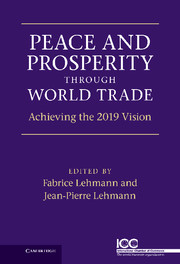Book contents
- Frontmatter
- Contents
- Notes on contributors
- Foreword
- Preface: the ICC vision
- Historical overview and dynamics
- Editorial note
- A Global systemic transformations
- B Governance of global trade
- Editorial introduction
- B1 Securing the global trade regime: the demand for global governance
- B2 The trade regime and the future of the WTO
- B3 WTO reform: the time to start is now
- B4 ‘Murky protectionism’ and the WTO
- B5 Preferential trade agreements: imagining a world with less discrimination
- B6 The G-20 after the Great Recession: rebalancing trade
- B7 The missing piece: global imbalances and the exchange rate regime
- B8 Trading knowledge fairly: intellectual property rules for global prosperity and environmental sustainability
- B9 Trade and subsidies: undermining the trading system with public funds
- B10 Trading labour: a dilemma for migration regimes
- C Poverty and global inequities
- D The long view on interlocking crises
- E Global business responsibilities
- Conclusion: the imperative of inclusive global growth
- Index
B7 - The missing piece: global imbalances and the exchange rate regime
Published online by Cambridge University Press: 05 July 2011
- Frontmatter
- Contents
- Notes on contributors
- Foreword
- Preface: the ICC vision
- Historical overview and dynamics
- Editorial note
- A Global systemic transformations
- B Governance of global trade
- Editorial introduction
- B1 Securing the global trade regime: the demand for global governance
- B2 The trade regime and the future of the WTO
- B3 WTO reform: the time to start is now
- B4 ‘Murky protectionism’ and the WTO
- B5 Preferential trade agreements: imagining a world with less discrimination
- B6 The G-20 after the Great Recession: rebalancing trade
- B7 The missing piece: global imbalances and the exchange rate regime
- B8 Trading knowledge fairly: intellectual property rules for global prosperity and environmental sustainability
- B9 Trade and subsidies: undermining the trading system with public funds
- B10 Trading labour: a dilemma for migration regimes
- C Poverty and global inequities
- D The long view on interlocking crises
- E Global business responsibilities
- Conclusion: the imperative of inclusive global growth
- Index
Summary
The exchange rate is the missing piece from the international debate on the reform of the financial architecture which has fallen under the remit of the G-20. Despite coming on stage briefly in October 2008, when President Sarkozy called for the reform of the Bretton Woods system and summoned the G-20 heads of state summit in Washington the following month, the issue of the existing exchange rate arrangements and their reform has still to be addressed through a deep and comprehensive discussion. Like a ghost waiting in the shadows, exchange rate arrangements and misalignments keep cropping up. Of particular concern, in the current monetary system, is the fact that the United States continues to provide global liquidity through its current account deficit – i.e. specifically the large flow of savings from developing countries into the United States. As a result the exchange rate remains at the heart of China-bashing in Washington. There is also discomfort about the volatility of the euro in the euro area. And the current account deficit and the critical fiscal position of the United States have raised worries among major emerging economies that hold substantial shares of US government debt. There is indeed a risk, albeit low, of the US inflating itself out of debt. As the risk of holding dollars has become more evident as a result of the financial crisis, questions have been raised on the soundness of the dollar-based international monetary system.
- Type
- Chapter
- Information
- Peace and Prosperity through World TradeAchieving the 2019 Vision, pp. 105 - 108Publisher: Cambridge University PressPrint publication year: 2010

